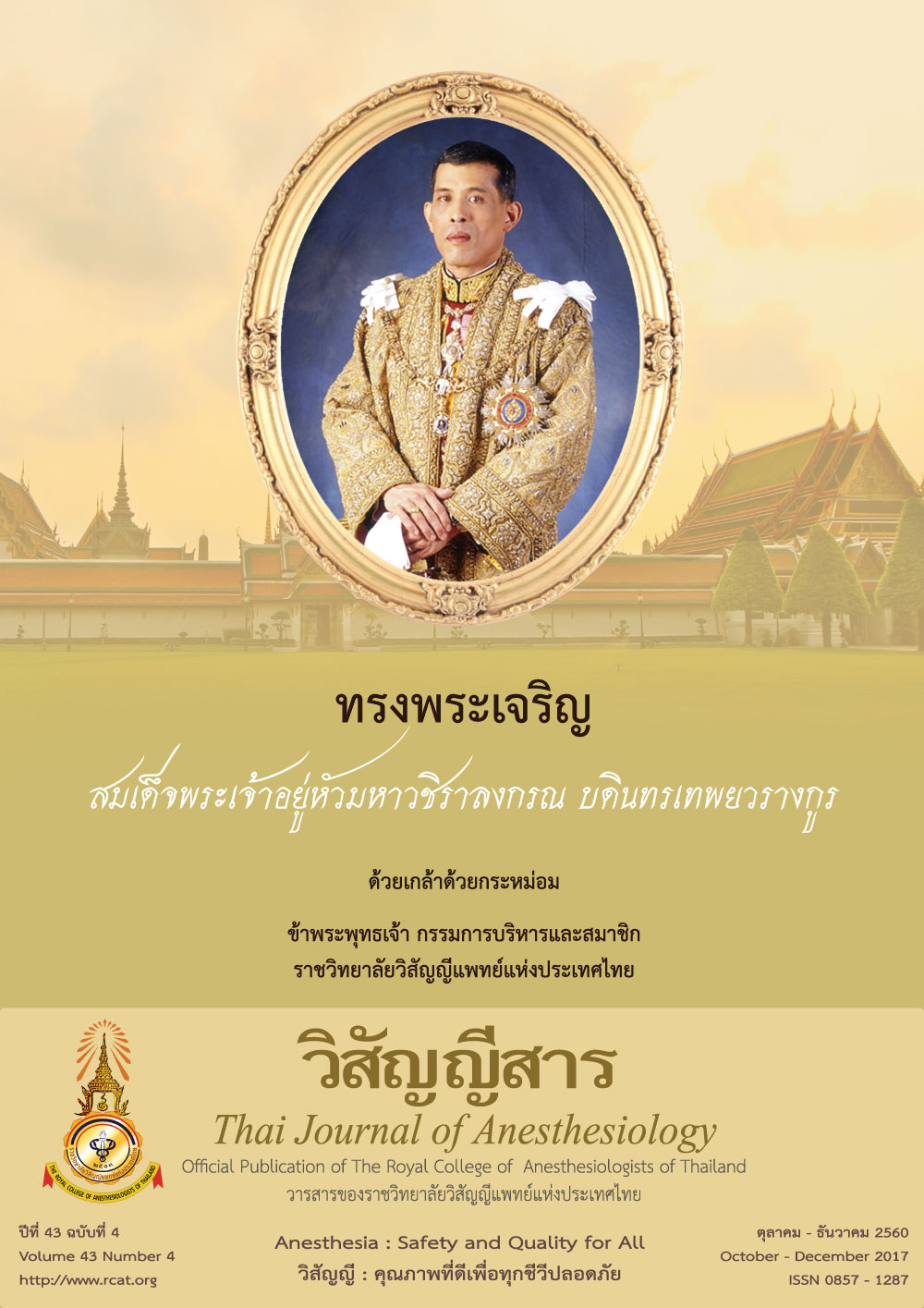Evaluation of bag-mask ventilation hand-on workshop for anesthetic nurse students
Main Article Content
Abstract
Background: Bag-mask ventilation skill is a
basic imperative skill for all anesthesia personals.
The Siriraj’s anesthetic nurse students training
committee emphasize in this proficiency, thus the
hand-on workshop of bag-mask ventilation was
provided to all students. The aim of the study is to
report the reaction from the students’ viewpoint
toward the teaching and evaluate this teaching
method from pre-and post study results. Methods: Forty
students studying in an anesthetic nurses training
program in the Department of Anesthesiology,
Faculty of Medicine Siriraj Hospital in academic
year 2015 were enrolled in this study. Each participant
participated hand-on workshop in mannequin in
bag-mask ventilation skill on the first day attended
in the training course. Before and after the workshop
evaluation was done by a validated checklist for
bag-mask ventilation. A questionnaire was performed
to report reactions of students after studying.
Results: Forty students participated in this study. The
result of the questionnaire showed 71.1 percent of the
students rated five scores (most favorable) of the
suitable of this training. The student rating five scores
of overall satisfaction toward the teaching accounted
for 73.7 percent. The Cronbach’s alpha of the
questionnaire was 0.87. The mean score comparing
before and after workshop significantly increased
from 12.3+2.7 to 23.9+0.9 with the total score of 25.
The mean difference was 11.6 with the standard
deviation of 2.5 (p-value<0.001). Conclusion: The
bag-mask ventilation, hand-on workshop showed
a high satisfaction score toward the teaching and
increased students’ performance in this skill. This
teaching method should be continued in the future.
Article Details
References
undergraduate anaesthesia: a quantitative and qualitative
analysis of practice at the University of Auckland. Anaesth
Intensive Care 2015;43(6):740-9.
2. Komatsu R, Kasuya Y, Yogo H, Sessler DI, Mascha E,
Yang D, et al. Learning curves for bag-and-mask
ventilation and orotracheal intubation: an application of
the cumulative sum method. Anesthesiology 2010;112(6):
1525-31.
3. Bredmose PP, Habig K, Davies G, Grier G, Lockey DJ.
Scenario based outdoor simulation in pre-hospital
trauma care using a simple mannequin model. Scand J
Trauma Resusc Emerg Med. 2010;18:13.
4. Nivatpumin P, Srirojanakul W. Evaluation of scenario
based hand-on workshop in general anesthesia in
emergency obstetric patients by nurse anesthesia
students. Thai J Anesthesiol. 2012;38(3):207-17.
5. Tiviraj S, Ngudgratoke S, Chinachoti T. Development
of performance skill assessment for open airway with
bag mask ventilation by nurse anesthesia students.
Thai J Anesthesiol. 2013;39(4):284-91.
6. Soleimanpour H, Gholipouri C, Panahi JR, Afhami MR,
Ghafouri RR, Golzari SE, et al. Role of anesthesiology
curriculum in improving bag-mask ventilation and
intubation success rates of emergency medicine
residents: a prospective descriptive study. BMC Emerg
Med. 2011;16:11:8.
7. Rosenthal ME, Adachi M, Ribaudo V, Mueck JT,
Schneider RF, Mayo PH, et.al. Achieving housestaff
competence in emergency airway management using
scenario based simulation training: comparison of attending
vs housestaff trainers. Chest. 2006;129(6):1453-8.
8. Reed T, Pirotte M, McHugh M, Oh L, Lovett S, Hoyt AE,
et al. Simulation-based mastery learning improves medical
student performance and retention of core clinical skills. Simul Healthc. 2016;11(3):173-80.
9. Pearlman SA, Zern SC, Blackson T, Ciarlo JA, Mackley AB,
Locke RG. Use of neonatal simulation models to assess
competency in bag-mask ventilation. J Perinatol. 2016;
36(3):242-6.
10. Murray DJ, Boulet JR, Kras JF, Woodhouse JA, Cox T,
McAllister JD. Acute care skills in anesthesia practice:
a simulation-based resident performance assessment.
Anesthesiology. 2004;101(5):1084-95.
11. McGaghie WC, Issenberg SB, Cohen ER, Barsuk JH,
Wayne DB. Does simulation-based medical education with
deliberate practice yield better results than traditional
clinical education? A meta-analytic comparative review
of the evidence. Acad Med. 2011;86(6):706-11.


